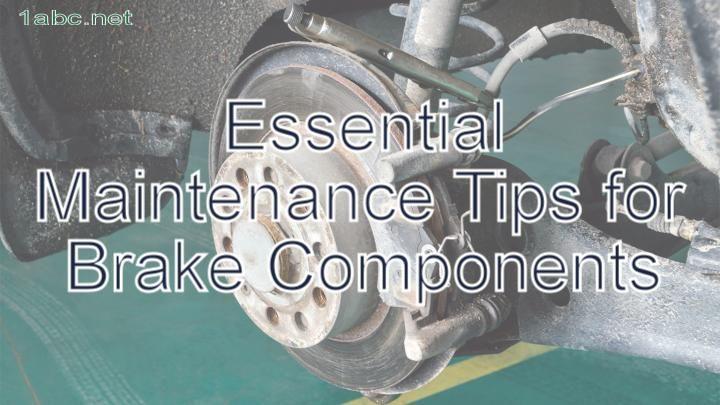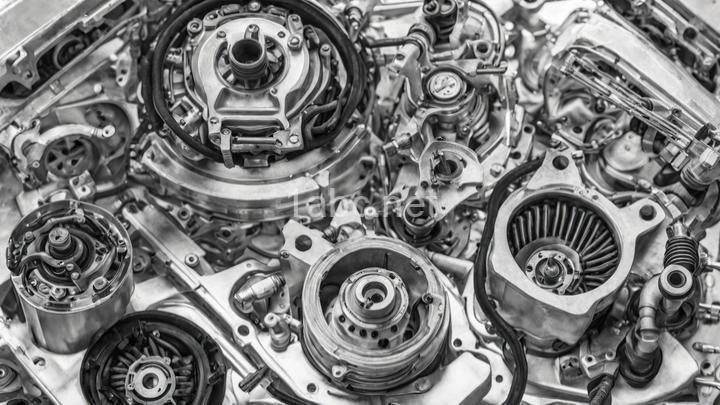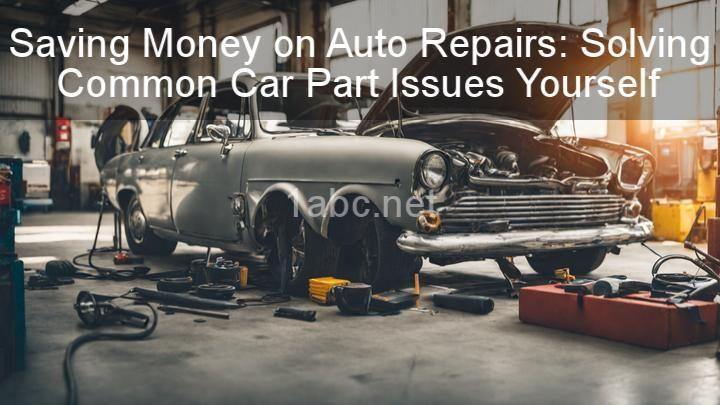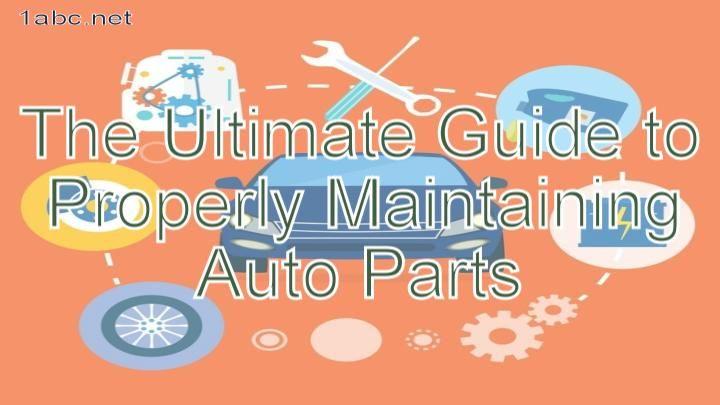Essential Maintenance Tips for Brake Components

Introduction:
Welcome to our blog post on essential maintenance tips for brake components! In this article, we will discuss the importance of regular brake maintenance and provide you with detailed information on how to ensure the safety and longevity of your brake system.
I. Understanding Brake Components:
Before we delve into maintenance tips, it's important to understand the main components involved in a typical braking system. The three key components are the rotors, pads, and calipers. The rotors are attached to the wheels and work with the pads and calipers to slow down or stop the vehicle. The pads are pressed against the rotors by the calipers, creating friction and causing the vehicle to decelerate or halt.
II. Signs of Brake Wear and Tear:
Recognizing the signs of brake wear and tear is crucial in preventing further damage and ensuring the effectiveness of your braking system. Common symptoms include squeaking or grinding noises when applying the brakes, vibrations, and reduced braking efficiency. If you notice any of these signs, it's important to address them promptly to avoid potential accidents and costly repairs.
III. DIY Inspection Techniques:
Performing regular visual inspections of your brake components can help you catch any visible signs of wear or damage early on. To conduct a DIY inspection, follow these steps:
- Lift the Vehicle: Use a jack to lift the vehicle off the ground, ensuring it is secure on jack stands.
- Inspect the Brake Pads: Look through the wheel spokes to inspect the brake pads. If they appear less than a quarter-inch thick, it's time to replace them.
- Check the Rotors: Examine the rotor's surface for any grooves or unevenness. If you can feel these imperfections with your finger or if the rotor is below the minimum thickness, it needs to be replaced.
- Inspect the Calipers: Check the calipers for signs of damage or leakage. If you notice any issues, it's best to have them inspected by a professional.
IV. Maintenance Tips for Brake Components:
To ensure the optimal performance and longevity of your brake components, follow these essential maintenance tips:
A. Cleaning:
Regularly cleaning your brake components is crucial to prevent the build-up of dirt, debris, and corrosive substances. Use a mild detergent and a soft brush or cloth to gently clean the rotors, pads, and calipers. Avoid using harsh chemicals or high-pressure water, as they can damage the components.
B. Lubrication:
Proper lubrication is essential for maintaining the smooth operation of your brake system. Apply a high-quality lubricant specifically designed for brakes to areas such as caliper slides and contact points. This will prevent sticking and ensure the calipers can move freely.
C. Regular Adjustments:
Periodic adjustments are particularly important for drum brakes. Follow general guidelines to adjust brake shoes properly, ensuring they are in the correct position and making proper contact with the drum. This will improve braking efficiency and reduce the risk of premature wear.
D. Fluid Checks and Replacement:
Regularly check the brake fluid levels and top up if necessary. Low brake fluid levels can negatively affect braking performance. Additionally, educate yourself on when and how often the brake fluid should be replaced entirely, as it can become contaminated over time.
V. Professional Maintenance:
While DIY inspections and maintenance are essential, it's important to acknowledge your limitations. If you lack experience or encounter complex issues during inspections or maintenance procedures, it's best to seek professional assistance. Professionals have the expertise, specialized tools, and diagnostic equipment to provide more in-depth brake service.
Conclusion:
Regular brake maintenance is essential for ensuring your safety and optimal performance on the road. By implementing these essential maintenance tips, you can prolong the life of your brake components and enjoy worry-free driving experiences. Remember to conduct regular visual inspections, clean and lubricate your brake components, perform necessary adjustments, and seek professional assistance when needed. Taking care of your brakes will not only save you money in the long run but also provide you with peace of mind knowing that your vehicle's braking system is in top condition.
FREQUENTLY ASKED QUESTIONS
Why is brake maintenance important?
Brake maintenance is important for several reasons:
- Safety: Properly functioning brakes are crucial for ensuring your safety on the road. Regular maintenance helps identify any issues early on, preventing potential brake failures or malfunctions that could lead to accidents.
- Performance: Well-maintained brakes provide optimal performance, allowing you to stop or slow down effectively. This is especially important in emergency situations where quick braking response can make a difference in avoiding a collision.
- Cost savings: Regular brake maintenance helps identify any minor issues before they escalate into major problems. Addressing these issues early can prevent more expensive repairs down the line. Additionally, well-maintained brakes tend to have a longer lifespan, reducing the need for frequent replacements.
- Vehicle longevity: By maintaining your brakes, you contribute to the overall longevity of your vehicle. Neglected or poorly maintained brakes can cause additional strain on other components, potentially leading to more extensive damage over time.
To ensure the safety and performance of your vehicle, it is recommended to follow the manufacturer's guidelines for brake maintenance, including regular inspections and servicing by a qualified mechanic.
How do I properly inspect brake pads and shoes?
To properly inspect brake pads and shoes, follow these steps:
- Start by visual inspection: Look through the wheel spokes and locate the brake caliper and rotor (for disc brakes) or the brake drum (for drum brakes).
- Check brake pad thickness: Measure the thickness of the brake pad. Most brake pads have a minimum recommended thickness marked on them, so make sure the pads are above this minimum limit.
- Check pad wear indicators: Some brake pads have built-in wear indicators, which are small metal tabs that will make contact with the rotor when the pads are worn out. If you see these indicators touching the rotor, it's time to replace the pads.
- Inspect brake shoe lining: For drum brakes, remove the wheel and drum to inspect the brake shoe lining. Look for any signs of wear, cracking, or unevenness. The lining thickness should be above the manufacturer's recommended minimum.
- Check for warping or damage: Inspect the brake rotors (for disc brakes) or the inside surface of the drum (for drum brakes) for any signs of warping, grooves, or damage. If you notice any irregularities, the rotors or drums may need to be resurfaced or replaced.
- Look for leaks: Check for any brake fluid leaks around the caliper or wheel cylinder. Leaking fluid can indicate a problem with the brake system that should be addressed immediately.
Remember, if you're not comfortable performing these inspections yourself, it's always recommended to have a qualified mechanic or technician inspect your brake pads and shoes for you.
What are the steps involved in cleaning brake components?
Cleaning brake components involves several steps. Here's a general outline of the process:
- Safety Precautions: Always prioritize safety when working with brake components. Wear protective gloves and eyewear, and work in a well-ventilated area.
- Remove Brake Components: Start by removing the brake components from the vehicle. This typically includes removing the brake calipers, brake pads, and rotors. Consult your vehicle's repair manual for specific instructions on how to safely remove these components.
- Inspect for Damage: Before cleaning, inspect the brake components for any signs of damage or excessive wear. Replace any worn-out or damaged parts as necessary.
- Preparing the Cleaning Solution: Prepare a cleaning solution by mixing a brake cleaner or degreaser with water as per the product instructions. Use a suitable container to hold the solution.
- Soak or Spray: Depending on the degree of dirt and contaminants, you can either soak the brake components in the cleaning solution or spray the solution directly onto the components. Follow the product instructions for the recommended method and duration of soaking.
- Scrubbing: Use a non-metallic brush or a toothbrush to scrub the brake components gently. Pay close attention to hard-to-reach areas and remove any stubborn dirt or grime.
- Rinse Thoroughly: After scrubbing, rinse the brake components thoroughly with clean water to remove any residue from the cleaning solution.
- Dry Completely: Allow the components to air dry completely. If desired, you can use compressed air or a clean, lint-free cloth to speed up the drying process.
- Reinstall Components: Once the cleaned brake components are completely dry, reinstall them back onto the vehicle following the manufacturer's instructions. Make sure to lubricate any necessary parts with brake lubricant.
It's important to note that the specific steps and products required may vary depending on the type of brake components and vehicles. Always consult the manufacturer's instructions or seek professional assistance if you are unsure about any step in the cleaning process.
How long do brake components typically last?
The lifespan of brake components can vary depending on several factors such as driving habits, vehicle type, and maintenance. However, as a general guideline:
- Brake Pads: Typically, brake pads can last anywhere between 30,000 to 70,000 miles (48,000 to 112,000 kilometers) or more, depending on driving conditions and pad material.
- Brake Rotors: Rotors usually last longer than brake pads. On average, they can last between 50,000 to 75,000 miles (80,000 to 120,000 kilometers) or more. However, their lifespan can be impacted by factors like heat, excessive wear, and damage.
- Brake Calipers: Brake calipers typically have a longer lifespan and may only need replacement if they become damaged or start malfunctioning.
- Brake Fluid: Brake fluid should be replaced periodically, typically every 2 years or as recommended by the vehicle manufacturer, as it can degrade over time and affect brake performance.
It's essential to note that these are general estimates, and actual brake component lifespan can vary. Regular inspection and maintenance by a qualified mechanic are important to ensure optimal brake performance and to detect any potential issues early on.
Are there any safety precautions I should take while maintaining brake components?
When maintaining brake components, it is important to observe certain safety precautions to ensure your well-being. Here are some essential safety measures you should follow:
- Wear protective gear: Always wear adequate eye protection and hand gloves to safeguard yourself from any potential hazards.
- Work in a well-ventilated area: Brake components often contain harmful substances such as asbestos or brake dust. Hence, it is crucial to work in a properly ventilated area to minimize the risk of inhaling these substances.
- Handle with care: Brake components can be sharp, so handle them with caution to avoid cuts or injuries. Additionally, be mindful of any hot surfaces or moving parts that might cause burns or accidents.
- Use proper tools: Ensure you have the right tools for the job, as using inappropriate tools can lead to damage or accidents. Follow the manufacturer's recommendations for specific tools and techniques.
- Disconnect the power source: When working on electronic brake systems, always disconnect the power source, such as the battery, to prevent accidental engagement of the brakes.
- Clean brake parts properly: When cleaning brake components, use appropriate solvents or cleaners, and follow the manufacturer's instructions. Improper cleaning agents can damage the components or pose health risks.
- Properly dispose of hazardous materials: Dispose of brake fluid, cleaning agents, and other hazardous materials according to local regulations. Never pour these substances down the drain or dispose of them improperly.
Remember, if you are uncertain about any aspect of brake maintenance, it is always best to consult a qualified professional for assistance.
What are the common causes of brake fluid leaks?
Brake fluid leaks can occur due to a variety of reasons. Here are some common causes of brake fluid leaks:
- Worn or damaged brake lines: Over time, brake lines can deteriorate or get damaged, leading to leaks. Corrosion, rust, or external damage can cause brake lines to develop cracks or holes.
- Faulty brake calipers: The brake calipers are responsible for pushing the brake pads against the rotor to create friction and stop the vehicle. If the calipers become seized or damaged, they may leak brake fluid.
- Damaged brake hoses: Brake hoses carry brake fluid from the brake lines to the brake calipers. If the hoses get worn out, cracked, or damaged, they can leak fluid.
- Leaking brake master cylinder: The master cylinder is an essential component that stores and distributes brake fluid to the various brake lines. If the master cylinder gets worn or damaged, it can result in fluid leaks.
- Defective wheel cylinders: In drum brake systems, wheel cylinders are responsible for applying the brake shoes to the brake drum. If the wheel cylinders become worn or damaged, they can leak brake fluid.
- Improper installation or maintenance: Poor installation or improper maintenance practices, such as not tightening connections properly, can lead to brake fluid leaks.
If you suspect a brake fluid leak in your vehicle, it's important to have it inspected and repaired by a qualified technician as soon as possible to ensure your safety on the road.
How can I prevent brake components from rusting or corroding?
To prevent brake components from rusting or corroding, you can follow these tips:
- Keep your vehicle clean: Regularly wash your car, including the brake system components, to remove road salt, dirt, and other debris that can accelerate corrosion.
- Avoid driving in harsh conditions: If possible, avoid driving in areas with excessive moisture, such as through deep water, heavy rain, or on salted roads. If you do encounter these conditions, rinse off your brakes afterward.
- Use a rust-resistant coating: Apply a rust-resistant coating specifically designed for brake components. This can create a protective barrier, reducing the chance of corrosion.
- Perform regular maintenance: Follow the recommended brake maintenance schedule. This includes inspecting and cleaning the brake system components, replacing worn-out parts, and lubricating as needed.
- Replace worn-out brakes promptly: If your brake pads, rotors, or other components are excessively worn or damaged, replace them promptly. Worn brake components can create conditions that accelerate rust and corrosion.
Remember, always consult your vehicle's manufacturer or a qualified mechanic for specific instructions and recommendations regarding brake maintenance to ensure the proper functioning of your vehicle's braking system.




